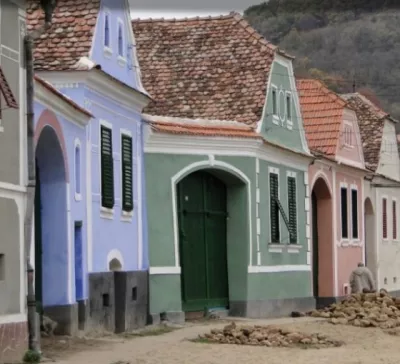Summary
The ‘Whole Village’ model works to revitalise and restore the cultural and natural heritage of Transylvanian rural areas. It addresses social and economic needs, making villages attractive for both locals and newcomers.
The process involves obtaining local authority support, evaluating cultural heritage, and engaging the community to set priorities, identifying financial resources, selecting projects leaders and teams, providing training, supporting local entrepreneurs, implementing sustainable village-development activities and continuous re-adaptation for improvement.
The initiative has restored 700 historic structures, planted three million trees, created 100 permanent jobs, and offered 140 seasonal opportunities, while fostering community spirit and sustainable development.
Results
The local NGO Mihai Eminescu Trust (MET) achieved the restoration of 700 historical structures and planting of three million trees, re-invigorating the landscape.
They empowered residents by offering various trainings, resulting in the creation of 100 jobs within MET projects and 140 seasonal opportunities during the peak tourist seasons.
Furthermore, the initiative inspired 20 villagers to establish their own guesthouses, welcoming tourists, while preserving the distinct local culture.
MET extended support to artisans as well, particularly weavers, assisting them in crafting and selling traditional carpets and embroideries that highlight the region's rich heritage.
Through the involvement of rural students, 2.2 million trees were planted during a reforestation campaign.
MET's thematic summer camps, initiated in 2012, have provided 200 children with unforgettable experiences in rural settings. Additionally, 75 children were offered the opportunity to participate in an architecture initiation course, broadening their perspective and sparking an appreciation for design.
Resources
Documents
Context
In 1990, numerous Transylvanian villages witnessed significant emigration of Romanian Saxons, leaving less than 10% of them in the region. Romania's rural areas face several challenges, such as insufficient project development and implementation capacity, minimal community participation, depopulation, an aging demographic, high unemployment and poverty rates, and migration. The historical legacy of the communist era has made the local Romanian Saxon communities sceptical toward community-led initiatives, making the implementation of the Whole Village concept more challenging. To solve this, the NGO Mihai Eminescu Trust (MET) takes advantage of cultural and natural heritage to encourage tourism as a means of income for rural families.
Objectives
The "Whole Village" concept aims to:
- The restoration, conservation, and revitalisation of cultural heritage.
- The involvement, consolidation, and empowerment of local communities.
- The development of the local economy through cultural and sustainable tourism.
Activities,key actors, and timeline
MET initially targeted the village of Viscri, where they developed the Whole Village concept. By raising awareness among the local communities of the potential of the existing heritage as the ground for dialogue between different e thnic groups and as an asset for sustainable development, they promoted cultural tourism and preserved local heritage, leading to the pilot project self-sufficiency. Similar initiatives have been carried out in the village of Rachis and by 2023, MET has expanded to nine other rural communities in Transylvania, positively impacting more than 6,500 people.
Today, MET focuses on restoring and preserving cultural, natural, and historical heritage, supporting small rural businesses and social entrepreneurship, and developing sustainable tourism, exemplified by Experience Transylvania (ET), a social enterprise managing heritage houses and guesthouses in Transylvania. The approach adopts particpatory methodologies and community dialogues with the local authorities and local actors to identify priorities, adapted to changing needs and challenges, diversifying the financial resources via national and international grants. Educational workshops and summer schools support the local youth with international and intergenerational transfers of know-how.
Success factors/lessons learnt
The MET has achieved remarkable feats by employing strategic thinking for rural development in Romania's Transylvania region. This approach involves meticulous planning and execution of projects in collaboration with the community, ensuring initia tives are aligned with local needs and aspirations. A significant contributor to their success is their steadfast dedication to conserving the cultural and natural heritage of Transylvania's villages. They've invigorated community spirit through capacity building, empowerment, and the transfer of knowledge across generations. By promoting traditional practices and bolstering local crafts and techniques, they safeguard identity and authenticity, create economic prospects, and enhance the well-being of local families. An innova tive element of their approach is the integration of tangible and intangible cultural heritage with na tural heritage, yielding a diverse and appealing cultural and eco-tourism portfolio, as exemplified by the Viscri village pilot project. MET has addressed challenges related to demographic shifts, ethnic diversity, and the emigration of the Saxon population through fostering dialogue, coexistence, and collaboration among varied communities
Contacts
Michaela Türk mtuerk@mihaieminescutrust.org

